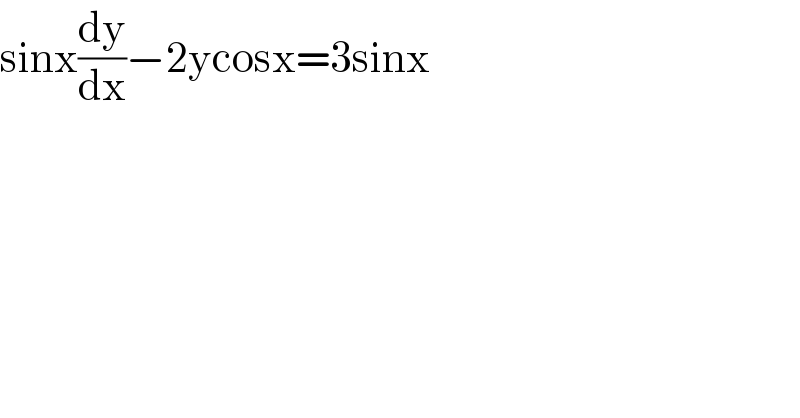
Previous in Differential Equation Next in Differential Equation
Question Number 102283 by Ar Brandon last updated on 08/Jul/20

$$\mathrm{sinx}\frac{\mathrm{dy}}{\mathrm{dx}}−\mathrm{2ycosx}=\mathrm{3sinx} \\ $$
Answered by john santu last updated on 08/Jul/20

$$\frac{{dy}}{{dx}}\:−\mathrm{2cot}\:{x}.{y}\:=\:\mathrm{3} \\ $$$${IF}\:\Rightarrow{u}\left({x}\right)={e}^{\int\:−\mathrm{2cot}\:{x}\:{dx}\:} =\:{e}^{−\mathrm{2ln}\left(\mathrm{sin}\:{x}\right)} =\mathrm{csc}^{\mathrm{2}} \:{x} \\ $$$$\Leftrightarrow{y}\:=\:\frac{\int\mathrm{3}\:{c}\mathrm{sc}^{\mathrm{2}} \:{x}\:{dx}\:+\:{C}\:}{\mathrm{csc}^{\mathrm{2}} \:{x}} \\ $$$${y}\:=\:\frac{−\mathrm{3cot}\:{x}\:+{C}}{\mathrm{cs}{c}^{\mathrm{2}} \:{x}}\: \\ $$$${y}\:=\:−\mathrm{3cot}\:{x}.\mathrm{sin}\:^{\mathrm{2}} {x}\:+\:{C}.\mathrm{sin}\:^{\mathrm{2}} {x} \\ $$$$\left({JS}\:\circledast\right) \\ $$
Commented by Ar Brandon last updated on 08/Jul/20
Thanks Mr John
Answered by Ar Brandon last updated on 08/Jul/20

$$\left\{\mathrm{sinx}\frac{\mathrm{dy}}{\mathrm{dx}}−\mathrm{2ycosx}=\mathrm{3sinx}\right\}\centerdot\frac{\mathrm{1}}{\mathrm{sin}^{\mathrm{3}} \mathrm{x}} \\ $$$$\Rightarrow\frac{\mathrm{1}}{\mathrm{sin}^{\mathrm{2}} \mathrm{x}}\centerdot\frac{\mathrm{dy}}{\mathrm{dx}}−\frac{\mathrm{2ycosx}}{\mathrm{sin}^{\mathrm{3}} \mathrm{x}}=\frac{\mathrm{3}}{\mathrm{sin}^{\mathrm{2}} \mathrm{x}} \\ $$$$\Rightarrow\mathrm{d}\left(\frac{\mathrm{y}}{\mathrm{sin}^{\mathrm{2}} \mathrm{x}}\right)=\frac{\mathrm{3}}{\mathrm{sin}^{\mathrm{2}} \mathrm{x}}\mathrm{dx} \\ $$$$\Rightarrow\frac{\mathrm{y}}{\mathrm{sin}^{\mathrm{2}} \mathrm{x}}=\mathrm{3}\int\mathrm{cosec}^{\mathrm{2}} \mathrm{xdx}=−\mathrm{3cotx}+\mathcal{C} \\ $$$$\Rightarrow\mathrm{y}=−\mathrm{3sinxcosx}+\mathcal{C}\mathrm{sin}^{\mathrm{2}} \mathrm{x} \\ $$
Commented by john santu last updated on 08/Jul/20

$${great} \\ $$
Answered by mathmax by abdo last updated on 08/Jul/20

$$\mathrm{y}^{'} \:\mathrm{sinx}−\mathrm{2ycosx}\:=\mathrm{3sinx} \\ $$$$\left(\mathrm{he}\right)\rightarrow\mathrm{y}^{'} \mathrm{sinx}\:=\mathrm{2y}\:\mathrm{cosx}\:\Rightarrow\frac{\mathrm{y}^{'} }{\mathrm{y}}\:=\mathrm{2}\frac{\mathrm{cosx}}{\mathrm{sinx}}\:\Rightarrow\mathrm{ln}\mid\mathrm{y}\mid\:=\mathrm{2ln}\mid\mathrm{sinx}\mid\:+\mathrm{c}\:\Rightarrow \\ $$$$\mathrm{y}\:=\mathrm{k}\:\mathrm{sin}^{\mathrm{2}} \mathrm{x}\:\:\:\:\mathrm{mvc}\:\mathrm{method}\:\mathrm{give}\:\mathrm{y}^{'} \:=\mathrm{k}^{'} \:\mathrm{sin}^{\mathrm{2}} \mathrm{x}\:+\mathrm{2kcosx}\:\mathrm{sinx} \\ $$$$\left.\mathrm{e}\Rightarrow\mathrm{k}^{'} \:\mathrm{sin}^{\mathrm{3}} \mathrm{x}+\mathrm{2k}\:\mathrm{cosx}\:\mathrm{sin}^{\mathrm{2}} \mathrm{x}−\mathrm{2cosx}\right)\mathrm{ksin}^{\mathrm{2}} \mathrm{x}\:=\mathrm{3sinx}\:\Rightarrow \\ $$$$\mathrm{k}^{'} \:\mathrm{sin}^{\mathrm{2}} \mathrm{x}\:=\mathrm{3}\:\Rightarrow\mathrm{k}^{'} \:=\frac{\mathrm{3}}{\mathrm{sin}^{\mathrm{2}} \mathrm{x}}\:\Rightarrow\:\mathrm{k}\:=\int\:\frac{\mathrm{3dx}}{\mathrm{sin}^{\mathrm{2}} \mathrm{x}}\:=\mathrm{3}\:\int\:\:\frac{\mathrm{dx}}{\mathrm{1}−\frac{\mathrm{1}}{\mathrm{tan}^{\mathrm{2}} \mathrm{x}+\mathrm{1}}} \\ $$$$=\mathrm{3}\int\:\:\:\frac{\mathrm{1}+\mathrm{tan}^{\mathrm{2}} \mathrm{x}}{\mathrm{tan}^{\mathrm{2}} \mathrm{x}}\:\mathrm{dx}\:=_{\mathrm{tanx}\:=\mathrm{t}} \:\:\:\mathrm{3}\:\int\:\:\frac{\mathrm{1}+\mathrm{t}^{\mathrm{2}} }{\mathrm{t}^{\mathrm{2}} \left(\mathrm{t}^{\mathrm{2}} \:+\mathrm{1}\right)}\mathrm{dt}\:=−\frac{\mathrm{3}}{\mathrm{t}}+\mathrm{c}\:=−\frac{\mathrm{3}}{\mathrm{tanx}}\:+\mathrm{c}\:\Rightarrow \\ $$$$\mathrm{y}\left(\mathrm{x}\right)\:=\left(−\frac{\mathrm{3}}{\mathrm{tanx}}+\mathrm{c}\right)\mathrm{sin}^{\mathrm{2}} \mathrm{x}\:=\mathrm{csin}^{\mathrm{2}} \mathrm{x}\:−\frac{\mathrm{3cosx}}{\mathrm{sinx}}\mathrm{sin}^{\mathrm{2}} \mathrm{x} \\ $$$$=\mathrm{c}\:\mathrm{sin}^{\mathrm{2}} \mathrm{x}−\frac{\mathrm{3}}{\mathrm{2}}\mathrm{sin}\left(\mathrm{2x}\right) \\ $$
